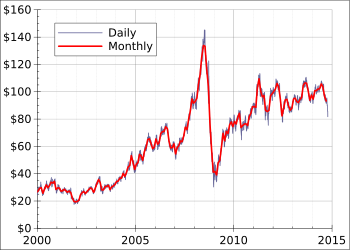Oddly enough it was market participants who took the spec side of the argument while pointy headed academics said it was a whole new market, or peak oil not speculation, that drove prices. They thought they were being profound when they asked "Where's the inventory" when really all they were doing was exposing their ignorance of the concept of in situ hoarding.
So you tell me, what caused the move from under $52 in February 2007 to $147 in the summer of 2008 to $32 that fall?
Before you answer remember that both Paul Tudor Jones and Wilbur Ross called it a bubble and bet accordingly.
From naked capitalism:
Yves here. I’ve read Dicker only occasionally, mainly when I was watching and blogging on the early 2008 oil bubble (on the “yes this IS a bubble” side of that controversy). I’ve found him to be sensible and often points to pieces of the picture that are important yet most commentators are missing.If you're interested we have dozens of posts on the 2008 move with details of how Goldman bagged their long-only index investing clients, how the CoT reports were manipulated and how oil was held off the market.
This post on the near term outlook for natural gas may give environmentalists cheer. Dicker’s description of how Chesapeake Energy has created a glut that will delay further investment means fracking foes may have more time to their opposition than they had thought originally. The initial development rush and the sense of inevitability created by the media has likely created the impression that the initial pace of drilling will continue, when that is just not in the cards.
By Dan Dicker, an energy analyst and a floor trader at the New York Mercantile Exchange with more than 25 years of oil trading experience. Cross posted from OilPrice’s premium service
Aubrey McClendon is gone – or at least he’s on his way out from Chesapeake Energy (CHK). But the destruction of the natural gas market, where he was the ringleader in the shale gas land grab and cratering well price, is his real legacy, and not likely to be recovered from anytime soon. While Aubrey will now go into a very wealthy retirement, he leaves behind a decimated market and a long road to making natural gas a true transition fuel to energy independence and a renewable future.
The market failed us, failed all of us as a nation – because it couldn’t prevent McClendon and Chesapeake from poking holes randomly through Texas and Western Pennsylvania in search of shale gas and ultimately flooding the market with it, cratering the price and its profitability. And it is margins and profitability that make markets work.
And while McClendon made himself the best paid CEO in the nation, he assured us that our necessary and important transition to natural gas would be made much more difficult, if not impossible: you just cannot support without profits. It is not just “cheap gas” that is the answer to spurring economic growth, grow manufacturing and sell natural gas as a transport fuel or even as an export fuel here in the US – it is margins and it is profits.
And Chesapeake destroyed that for everyone in the gas game...MORE
Good times, good times.
As to gas there is an interplay between the expanding uses (transportation, coal-to-gas switching, feedstock etc.) and rapid decline rates of fracked shale wells on the demand side and the immense amounts of gas available to anyone who can foot the bill on the supply side.
An observation not original to me--If prices stay below $4.00 a lot of the holes drilled over the last few year will not pay for themselves but the companies will have raised tons of money based on their initial production rates.
That is damn close to the definition of a Ponzi scheme.
